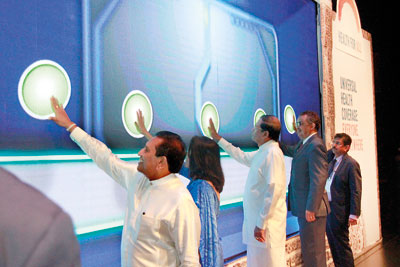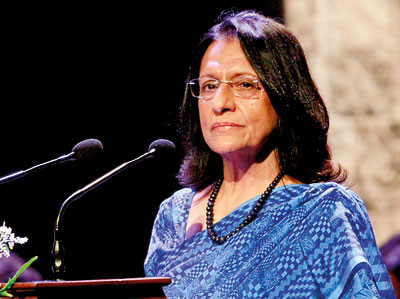News
A family doctor for all soon – Minister
PM urges better management of hospitals to get more value for money
Sri Lanka was the cynosure of all eyes as Global World Health Day 2018 was celebrated last Saturday at Nelum Pokuna in Colombo, with the participation of high-level leaders not only of the country but also the World Health Organisation (WHO).

From left Health Minister Rajitha Senaratne, WHO SEAR Regional Director Dr. Poonam Khetrapal Singh, President Maithripala Sirisena, WHO Director-General Dr. Tedros Adhanom Ghebreyesus and Health Services Director-General Dr. Anil Jasinghe launching the Health TV channel by placing their palms on the screen. Pix by Indika Handuwala
The commitment of Sri Lanka to health was seen when President Maithripala Sirisena, Prime Minister Ranil Wickremesinghe and Health Minister Rajitha Senaratne along with WHO Director-General Dr. Tedros Adhanom Ghebreyesus and the Regional Director of the South-East Asia Region (SEAR) Dr. Poonam Khetrapal Singh took part in a programme which lasted nearly three hours. They were joined by Maldivian Health Minister Abdulla Nazim Ibrahim.
Speeches, cultural items and many ‘launches’ marked the celebrations with the WHO deciding to hold World Health Day with its theme of ‘Universal Health Coverage (UHC): Everyone, Everywhere’ in Sri Lanka, as the country is known as a provider of good health at low cost.
Health Minister Senaratne, calling April 7, World Health Day a “truly historic day”, made a pledge that Sri Lanka was making use of primary level curative health institutions to move towards a state-led system of ‘family doctors’ accountable for smaller populations.
“‘A Family Doctor for All’ where a trained family physician will be responsible for a population of around 5,000 is our aim. We will have an ‘Essential Service Package’ that will be delivered in close cooperation with the community,” he said, pointing out that while UHC has been around for decades with free health care paid for by the state, overall out-of-pocket spending needs to be further reduced and access and coverage also need to be made truly universal. “In re-orienting our health system to continue to provide UHC as the way forward, we are now further strengthening primary health care.”
He said that in the 1920s, the country’s health indicators were not very different from much of South Asia. This was until the health reforms in the 1930s, when primary health units — Medical Officer of Health Areas — were established.
“Sri Lanka has a state-funded and run healthcare system providing healthcare free of charge at the point of delivery. The health budget funded by the public sector, has a pro-poor health service that facilitates access to lower socio-economic strata of society. In spite of this situation, patients, especially those in the private sector, have had to bear significant out-of-pocket expenditure until recently due to the relatively high cost of drugs. To address this situation, we have taken action to reduce the price of essential, mostly-used drugs, most by 40-100 percent and some even by 300 percent. We have also lifted the price ceiling on cancer drugs to be provided free at the government facilities and extended similar benefits towards eye care, providing quality eye lenses to patients free of charge. Similar packages have been introduced for expensive, urgently needed cardio-thoracic care, including cardiac stents. The process, which has already started, is still being fine-tuned and will hopefully be fully operational by 2020,” the Minister said.
Dr. Senaratne said Sri Lanka today faced a dual challenge – non-communicable diseases (NCDs) that account for more than 75 percent of the disease burden in terms of mortality and morbidity and a rapidly ageing population. As such, the primary healthcare system needs to adjust to address these two (epidemiologic and demographic) transitions.
Pointing out that Sri Lanka is addressing the NCD epidemic from different fronts, based on the Best Buys of the WHO, he said the country has strict policies with regard to tobacco use, a wide range of clean air laws, a traffic light system for sweetened beverages and spaces for physical activity and to engage in a healthy lifestyle, backed up by education and communication support. But the country continues to face the adverse impacts of climate change, with a need to further strengthen preparedness and response capacity. Access to timely data and information and their use for decision-making also need to be strengthened further to improve the efficiency and effectiveness of the health system, while human resources need to be re-aligned to increasing and changing healthcare needs.
While offering to share and to add to global knowledge, the Minister said Sri Lanka also needed to learn from other countries that had succeeded in areas where the country was still lagging – like further reduction in the already low maternal and neonatal mortality; sustainable health financing and protecting equity and social justice amidst rapid economic growth; and achieving UHC for all. “We also look forward to WHO’s support in strengthening our capacity for global health diplomacy,” he added.
Earlier, pointing out that the country has free education and free health, Prime Minister Wickremesinghe, however, explained that there were many challenges that Sri Lanka was facing in the delivery of free health services, while there was also a change in the gamut of health issues being faced by the people and also developments in this sector, making the costs go up.
“Construction of hospitals is becoming more complex and although we reach the health goals, the country’s debt repayment has gone up, while the health expenditure has come down. Sixty to 70 percent of the budget is channelled for debt repayment and the worst years were and are last year, this year and next year, but the Finance Minister has ensured that the country spends money on both education and health,” he said, assuring that as the debt burden eased, the funding for these two sectors could be increased. Meanwhile, another area of focus should be housing where there is “a lot to be done”.
Hospitals should be better managed financially, Mr. Wickremesinghe urged, stressing that 40 percent of the low-income group depended on state hospitals. “If there is better management and better value for money, more can be achieved for less,” he pointed out.
Focusing on the brain-drain of health personnel, he said that the country should find ways to induce them to stay back. Smilingly, he explained that someone told him that if the Medical Faculties in Sri Lanka were closed, hospitals in New Zealand, Australia and the United Kingdom would also have to close. This indicates how much we are losing.
Sri Lanka needs fast growth, as when the economy grows faster, with both local and foreign investment, more funding can be pumped into education and health. These are all tied together – higher growth, more money for spending on better value, Mr. Wickremesinghe added.
The celebrations included the launch of the coffee table book, ‘The Story of Public Health in Sri Lanka’ followed by a screening of a short film on the same topic; the issuance of a first-day cover and stamps; and the release of the Sri Lanka-WHO Country Cooperation Strategy 2018-23.
The other initiatives included the announcement of the Tobacco Cessation package – Quitline 1948 and digital platform; launch of the ‘National Health TV Channel’ operated by the Health Ministry to educate the public on NCDs and create a broad knowledge on family health, nutrition, sports and family life and the launch of the E-health card, an electronic card with the unique Personal Health Number of each person. The card stores important medical information of the holder.
| Dr. Singh stresses importance of access to quality frontline healthcare | |
“Access to quality frontline healthcare is essential. Quality frontline services enhance equity,” stressed Dr. Poonam Khetrapal Singh, WHO Regional Director for the South-East Asia Region (SEAR), last Saturday.  WHO SEAR Regional Director Dr. Poonam Khetrapal Singh addressing the gathering In the information package distributed that day, while commending the numerous achievements of Sri Lanka, there is a crucial question that is being posed: Have we achieved UHC? The answer is: “There is evidence that some are missing out on health coverage in Sri Lanka.” And these “some” include:
To redress this situation, what “more” can be done to achieve UHC – Ensure that all policies are conducive to health; all essential medicines are available at all levels; trained health staff are equitably distributed; protection for the poor from having to pay for health services; all interventions being evidence-based, effective and safe; information being available for decision-making at all levels; primary care is re-organised to provide equitable access to services; disparities in service provision are minimised; care services are shifted to be people-centred; and the engagement and participation of people. |

